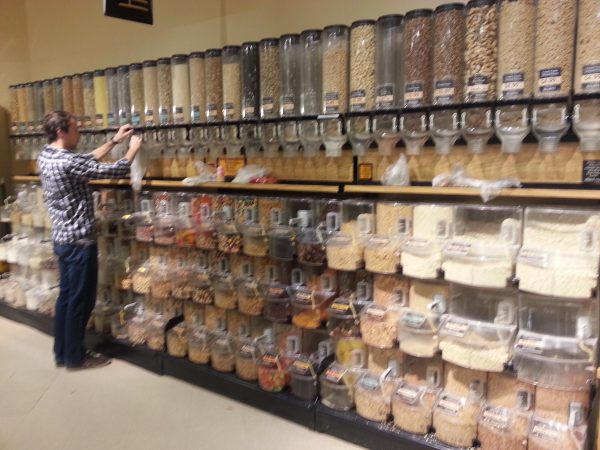Since moving away from home and subsequently being forced to become more self-sufficient, one of the biggest challenges I’ve faced is how to eat healthy with a limited budget. The following is a bit about how I changed my diet for the better both for myself and for the environment.
For my first year and a half of college, I sustained myself on ramen noodles. I was eating usually one to two packs of ramen noodles every day; it got to the point where if I went without them, I would have withdrawals (okay, maybe I’m being a little melodramatic). The ramen noodle advantage is that they’re extremely cheap and they’re easy to make. Unfortunately, they pack way too much sodium (1960 mg – mostly in the flavor packet). And they’re not exactly environmentally friendly either – with each packet individually wrapped in plastic, and multi-packs wrapping the whole package in another plastic bag.
After a while of eating entirely too much ramen, I started noticing my health taking a turn for the worse – and this unfailingly had an effect on not just my physical health, but my mental, emotional and social health as well – and I decided it was time for a change. Luckily, eating healthier oftentimes (if not always) goes hand-in-hand with being more environmentally responsible.
So I read a couple Michael Pollan books, and I started figuring out that eating healthier and more responsibly isn’t really all that hard. My first big step involved setting aside time to go grocery shopping once every week – once I mastered this habit, the rest fell in place rather easily. I started going to Rainbow, and instead of heading for the aisles, I stayed on the outside of the store – starting in produce, heading through the nuts, and then dairy. I gradually started getting almost only fresh foods, rather than foods with lots of preservatives and no expiration date. I got nuts from the wall-mounted dispensers where I could reuse the same bags over and over each week.
My next big step involved moving from the grocery store to food co-ops. If you live in the Twin Cities, there’s no shortage of them. The nice part about co-ops is that most of what you’re buying is produced locally, and the money you spend stays in your community. Once you start shopping at a co-op, you might find that it’s difficult to eat all that unhealthily even if you’re trying.
My next goal is to start going to farmer’s markets more often – for many of the same reasons listed in the previous paragraph. Getting to know the people who grow your food is both a smart and rewarding way to take care of yourself and your community.
Lastly, if you’re living on a budget, refrain as much as possible from eating out. I cannot stress enough how much extra money I was spending every week from eating out even just once or twice. I know from firsthand experience that it can be hard to resist the allure and ease of a restaurant or a fast food meal, but you’ll be doing your wallet and your health a favor by cooking your own meal. (Okay, I suppose, if you absolutely have to eat out, make sure to utilize the Do It Green! Directory so you know that the places where you eat care about the environment and community!)








